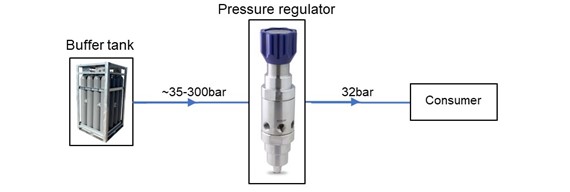What is a high pressure regulator, and what it is used for?
The function of this produc:
- to decrease the pressure of a high-pressure zone (supply/inlet)
- to a lower pressure value (consumer/outlet),
- often while volumetric flow and inlet pressure fluctuate.
For example, let’s consider a gas cylinder bundle, which, when fully filled is at 300 bar pressure. This information is found on the data plate of the gas cylinder bundle. In our example, the consumer needs a lower pressure level: 32 bar, so we need to use a pressure regulator. Naturally, as we consume gas, the pressure of the bundle will drop. Thi product is designed to keep the outlet pressure as stable as possible, even if the consumption and the inlet pressure is changing.
In practice, pressure regulators are sometimes also called pressure reducers. These names are used in both liquid and gas applications, with different material choice, and sometimes different designs adapted for the media in use.
When selecting a pressure regulator
- It is essential to consider the whole potential range of inlet pressures. Physics tells us, that pressure difference drives the flow, so if we expect the regulator to supply the same output (flow rate) at 50 bar inlet pressure as it does at 300 bar, we have to consider this requirement when we select our piece of equipment.
- Back to our previous example: if our bundle is used as a puffer, where a compressor turns on at 200 bar, and fills it back up to 300 bar, a single-stage regulator is perfect for the task. However, if for any reason (technological, financial, etc.) the supply comes from the bundle alone, we will need a regulator that maintains the desired 32 bar outlet pressure till the lowest possible gas cylinder pressure.
A two-stage pressure reducer can provide an answer for this challenge.
In terms of usage necessary to know
To be able to size and select, the following information is essential:
- Inlet pressure
- Outlet pressure
- Maximum tolerance in the fluctuation of outlet pressure
- Required flow rate of the consumer, or Cv value of the regulator
- Media
- Temperature (of the media, and the environment if extreme)
- Non-venting, or self-venting
- Connection types and sizes
- Configuration of connecting ports
- The usage of a manometer is necessary on both sides, inlet and outlet
- Requirements on preferred materials (stainless steel, duplex, etc.)
Other information about the high pressure regulator valve
You can find further information about the high pressure regulator on our partner’s page.
Other useful information about the pressure of the gas cylinders and the data plate of the gas cylinder bundles:


